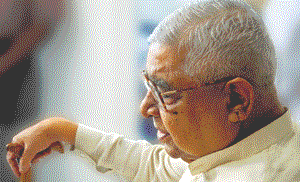| Plus |
World renowned exponent of Vipassana meditation, Goenkaji, now in Sri Lanka, recollects his transformation from a stressed-out businessman to modern-day ‘messenger of Vipassana’ |
|||||
|
Master of meditation By D.C. Ranatunga
Describing himself as "a messenger of Vipassana", the world renowned meditation master Shri S.N. Goenka, now on a visit to Sri Lanka, is a keen follower of the Buddha whom he calls "the greatest super scientist of the spiritual world".
At 82, Goenkaji is suffering from a back ailment. "He is getting a hot fomentation. It will take a few minutes," a member of his staff said apologetically as we waited for him in his suite at the Global Towers on Marine Drive. "We also record all his interviews for our archives," the staff member added as the television crew set up their equipment. As Goenkaji walked in slowly with the help of a walking stick accompanied by his wife, he showed signs of discomfort, yet he was smiling and cheerful. "Jaraapi dukka," he said as he quietly sat down reminding us that life is full of suffering. He was calm and composed. He was not in a hurry. He did not order the TV crew to hurry up. He was willing to wait until they were ready. A very pleasant personality, he spoke of his own
experience to illustrate how Vipassana meditation helps. "I
was forced to go to a ten-day meditation course in Burma. I was
suffering from a severe type of migraine headache. The best doctors
in Burma could not cure me. When the attacks came, no pain-killer
would work. So they started giving me morphine injections. They
told me in a few years I would be a morphine addict and that would
be more dangerous and harmful. Since I used to go abroad on business
they wanted me to see whether doctors in those countries could find
a cure but no one could." Goenkaji recalled his personality back then. "I was self-centred. As a successful businessman, I wanted to have my way. I was short tempered and would shout at anyone going against my wishes. I was full of anger." To Goenkaji, Vipassana meant Buddhism and as a Hindu, he could not follow such a meditation course. He would respect the Buddha's image but to follow Vipassana he had to embrace Buddhism, he thought. And he could not do it. Then he discussed the problem with another friend who asked him the simple question whether he was against 'Sila' or morality. Every religion teaches morality - so as a Hindu he was not against it. Vipassana will teach you how to lead a moral life, the friend said. During the ten days you would be taught how to control the mind, how to become the master of your mind without being a slave to it. They would teach 'Samadhi' which would help you to concentrate. It would even purify the mind to some extent. Yet there would be so many impurities that would come up all the time. The deepest level of the mind would get purified through 'Panna', the friend said. He convinced Goenkaji to follow the course. And he did. "It was so pure. I couldn't find any holes. And it started giving results - 'akaliko' - results here and now. No more morphine. Not that I was totally free from anger, hatred, fear or ego, but life started changing. And no one asked me whether I was a Buddhist," Goenkaji recalled. He convinced his family members and others to follow Vipassana. Greatly encouraged by the response, Goenkaji decided to spread the message for the benefit of others. "Buddha taught people how to lead a good life - good for oneself, good for others. He taught a way of life, a healthy, harmonious way of life.” The Goenka couple lives in Mumbai with their six sons - all married - in the same compound. They have ten grandchildren. The sons are all businessmen. Goenkaji has taught 930 teachers to take the message of Vipassana throughout the world. One hundred and ten centres have been established in different countries and where there are no centres, the teachers hold courses - ranging from ten to 45 days. And the response has been tremendous. "Followers of every religion follow these courses. Among them are Muslims, Hindus, Christians, Jews, Parsis, Sikhs, Jains - they all come. Not only them, their leaders also come. Up to now about 5000 Christian priests and nuns have participated in our programmes. All these people come because they have nothing to say against the teachings of the Buddha," Goenkaji said. He is convinced that Vipassana will help everyone in a country like Sri Lanka where people have so much of devotion and respect for the Buddha and His teachings. Goenkaji describes Vipassana as a simple, practical way to achieve real peace of mind and to lead a happy, useful life. Vipassana means "to see things as they really are". It is a logical process of mental purification through self-observation. "From time to time, we all experience agitation, frustration and disharmony. When we suffer, we do not keep our misery limited to ourselves; instead, we keep distributing it to others. Certainly this is not a proper way to live. We all long to live at peace with ourselves and with those around us. After all, human beings are social beings. We have to live and interact with others. Vipassana enables us to experience peace and harmony. It purifies the mind, freeing it from suffering and deep-seated causes of suffering. The practice leads step-by-step to the highest spiritual goal of full liberation from all mental defilements," a brochure he gave me explains.
|
||||||
Copyright © 2006 Wijeya Newspapers
Ltd. All rights reserved. |
